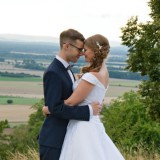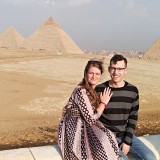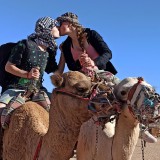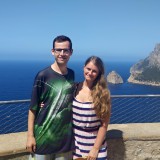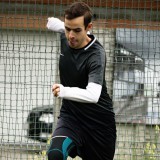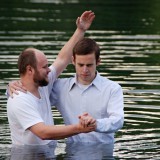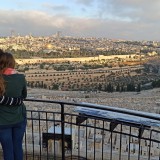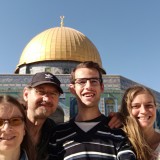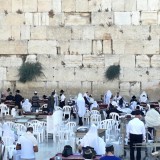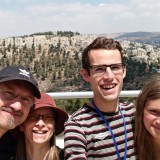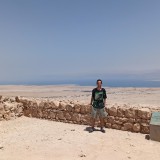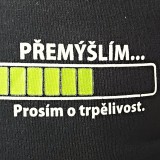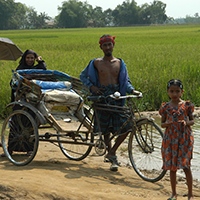Vilda: From the Wailing Wall to Children in Bangladesh
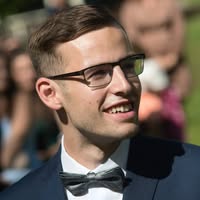
“Don't ask yourself what the world needs. Ask yourself what makes you come alive, and then go do that. Because what the world needs is people who have come alive.” This is the personal motto of Vilém Škuta, the new coordinator of the BanglaKids program, dedicated to helping children in distant Bangladesh. How do his language skills, passion for football, and meticulousness intersect with work that really changes lives?
BanglaKids Coordinator
Vilda, how did you come to coordinate the BanglaKids programme and the humanitarian organisation ADRA?
.jpg) It all started when my wife and I moved to Prague. I was looking for a job in Prague because commuting to Olomouc for my PhD was difficult. I wanted a full-time job so that I could quit my PhD. I researched job offers and knew about the ADRA humanitarian organisation through the church.
It all started when my wife and I moved to Prague. I was looking for a job in Prague because commuting to Olomouc for my PhD was difficult. I wanted a full-time job so that I could quit my PhD. I researched job offers and knew about the ADRA humanitarian organisation through the church.
Moreover, as a trained religious scholar, working in a non-profit organisation was a natural choice for me. In fact, when I applied to study in this field in Olomouc years ago, the school's advertisement had mentioned the possibility of working in non-profits, including ADRA. I took this as a sign that this was the right path for me. It was a combination of chance, faith, and my focus.
What do you consider to be the most important aspect of your role as coordinator of the BanglaKids programme?
The most important thing for the position is the art of communication. Firstly, it's important to communicate well with the coordinators in Bangladesh, but most importantly, it's essential to communicate well with our donors. It's also helpful to have a good memory and remember the donors. Everyone is unique and may have different needs, and as coordinator, I want to meet those needs as much as possible. After all, it is also a way of showing gratitude to donors for supporting children in need in Bangladesh.
Donors = Our Energy
What energises you in your work on behalf of Bangladeshi children?
I am always delighted when a donor writes to say, “Thank you for what you do.” Recently, Mrs Zajickova, a long-term donor, visited us, and when she was saying goodbye, she said, 'Thank you for your work.' She said it as though we were heroes. Of course, we don't see ourselves as heroes, but it's nice to know that someone recognises the value of our work.
I am also happy when donors respond to the children's letters or write to tell me how pleased they are with the photos. One donor even wrote to say that she was touched. Although it is administratively demanding, such feedback shows that our work is meaningful and having a real impact.
What would you like to say to people who want to support the BanglaKids programme?
Thank you. Thank you very much. This is one of the phrases I use most often in emails to donors because it's all about them. Without their support, we wouldn't be able to do this work at all. In my eyes, donors are more important than I am as a humanitarian worker.
How would you like people or donors to remember you?
I have no ambitions. It's enough for me to be remembered. :) I am just starting out, and it would be enough for me if people remembered that, if they needed anything from BanglaKids, they should contact me. They can write to me and we'll work things out together, whatever the problem.
Vilda and his interests
You are very patient and precise. How do these qualities manifest themselves in your life?My wife really appreciates my patience, especially since she says she doesn't have much herself. She admires and is grateful for my patience, whether it's with her or with others.
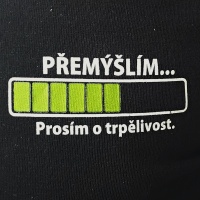 I've had precision since primary school – I received praise for diligence and thoroughness. When I do something, I always take responsibility and make sure I do it properly. Even if it slows down the process, I need to make sure that everything is correct before signing off.
I've had precision since primary school – I received praise for diligence and thoroughness. When I do something, I always take responsibility and make sure I do it properly. Even if it slows down the process, I need to make sure that everything is correct before signing off.
My wife sometimes says I'm slow because my attention to detail can slow things down. However, it's precisely because of this slower pace and patience that I can listen to others and give them time to do things properly.
What made you interested in languages?
I started learning English at primary school, followed by German in the sixth grade. I realised that I was good at languages and enjoyed them. I felt that I had some talent for languages, so I developed it further at university. I chose Judaistics as a subject alongside Religious Studies, where Hebrew is compulsory. Then I added Arabic. When I had the opportunity to enrol in a language, I chose Italian because I was planning a trip to Italy and the course was free.
Which language fascinated you the most?
.jpg) Hebrew certainly fascinated me the most because it's completely different – a new writing system, writing from right to left, and the grammar is different too. It was a huge challenge, but I was really curious about it.
Hebrew certainly fascinated me the most because it's completely different – a new writing system, writing from right to left, and the grammar is different too. It was a huge challenge, but I was really curious about it.
Is it true that Hebrew was a dead language?
Yes. For many centuries, Hebrew was a dead language, or rather a purely liturgical language used by devout Jews. It was not until the establishment of the State of Israel in 1948 that it became an official language again, marking its true 'return to life'. Since then, it has been used in everyday life.
You studied in Jerusalem. How was it? Did you visit the Wailing Wall?
.jpg) Yes, I went to the Wailing Wall. I'm grateful for that, as I was just there with my dad, which was a very powerful experience for me. While in Jerusalem, I completed an internship at Yad Vashem, the international memorial to the victims of the Holocaust. There, I catalogued Czech, Slovak, and German sources from the Second World War, which was a fascinating experience. It helped me a lot to get a sense of what working in the field is like in practice.
Yes, I went to the Wailing Wall. I'm grateful for that, as I was just there with my dad, which was a very powerful experience for me. While in Jerusalem, I completed an internship at Yad Vashem, the international memorial to the victims of the Holocaust. There, I catalogued Czech, Slovak, and German sources from the Second World War, which was a fascinating experience. It helped me a lot to get a sense of what working in the field is like in practice.
I also really appreciated the opportunity to live in a foreign country. While it was enriching, it also made me realise how grateful I am for my loved ones and how challenging it is to be away from home. I met some wonderful people in Israel, some of whom I now consider close friends, but home is still home. I especially missed my girlfriend at the time, who is now my wife.
Passion for the game!
We know you love football. Are you an active player or more of a fan?
Actually, both. I play recreationally, but as a fan, I regularly watch football. I have my favourite clubs.
Which ones?
In the Czech Republic, it's SFC Opava because I'm from Opava. Globally, my favourite team is Arsenal. I've liked the London club since I was a child.
What do you like about football?
.jpg)
A whole range of things. I enjoy ball games and anything that's played. I like that football is a team sport because it requires cooperation, which is what attracts me to it more than individual performance.
As a fan, I'm fascinated by how some footballers can create. I consider beautiful passes and nice goals to be an art, and they always warm my heart. I'm also inspired by players who come from poor backgrounds and make it to the top.
Do you have a favourite player story?
Yes, definitely. The first one that comes to mind is Sadio Mané, a Senegalese footballer who played for Liverpool. He came from an extremely poor background, but he never forgot his roots. Even though he was already famous, life was not easy for him. I read that he still tries to help his home area, even building a hospital there and funding development projects. Despite having a lot of money, he remains modest — he says he doesn't need ten cars or the latest phone. He's a huge inspiration to me.
Which player impressed you with their football skills?
Thierry Henry. He was my childhood idol — a footballer I greatly admired. From a very young age, I was fascinated by his style and ability on the pitch.
You mentioned that you enjoy different types of games. What do you play?
.jpg) My wife and I like playing board games, especially cooperative ones. We used to play them a lot, but now we both work, we don't have as much time as they tend to be quite long. Otherwise, we play Dobble, and we recently bought a deck of classic Uno cards.
My wife and I like playing board games, especially cooperative ones. We used to play them a lot, but now we both work, we don't have as much time as they tend to be quite long. Otherwise, we play Dobble, and we recently bought a deck of classic Uno cards.
What is it about those games that you enjoy so much?Every game has something great about it. I love it when something really works and other people notice. It's about the fun we have together, socialising and laughing. Funny moments or successes create good memories. Even though I'm primarily melancholic, the choleric in me comes alive when I play! I like winning — I can lose, but the feeling of winning is irreplaceable!
Life-changing motto
Your profile motto is very powerful. When did you first hear it, what made it speak to you, and how does it influence your approach to life?
I first read it in a book. The author said that when he saw this quote, it changed his life. He started thinking about life in a whole new way. There's a lot of truth in that.
.jpg) You can just see in some people that they enjoy their work, that it fulfils them, and that's what makes them great at it. That's something that spoke to me. I want to be in a place where I will flourish, excel and be blessed by the Lord God.
You can just see in some people that they enjoy their work, that it fulfils them, and that's what makes them great at it. That's something that spoke to me. I want to be in a place where I will flourish, excel and be blessed by the Lord God.
What advice would you give to people who are still looking for what makes them come alive?
Keep searching. Seek, and you will find.
Final thought?
I'll end with my motto: "Don't ask yourself what the world needs. Ask yourself what makes you come alive, and then go do that. Because what the world needs is people who have come alive."
----
P.S. What do you like to cook, and what do you like to eat? :)
I love Italian food, especially pasta. The dish I specialise in is lasagne — I love it very much. Otherwise, I just love any kind of pasta. If there's pasta, I'm happy. I also like cheese a lot.
P.P.S. Once the interview had been completed and edited, we discovered the author of the quote that had had such a profound influence on Vilda's life. It is Howard Thurman (1899-1981), a prominent American Baptist theologian, author and leading figure in the African-American civil rights movement. Inspired by his meeting with Mahatma Gandhi, he pioneered the idea of nonviolent resistance to the laws of apartheid and racial segregation. He also served as a spiritual mentor to Martin Luther King Jr.
